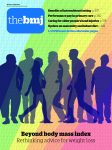
Scarlett McNally: We can’t rely on the robots to fix the NHS
- Scarlett McNally, professor
- scarlettmcnally{at}cantab.net
Follow Scarlett on X @scarlettmcnally
I’m currently taking a few weeks away from my work as a surgeon, recovering from a hip replacement. My surgery was robot assisted and the results are astonishing. Evidence on robot assisted surgery shows shorter hospital stays and fewer complications.1 They seem to work particularly well with patients who have obesity or complex medical problems where physical access is difficult.2
As part of the NHS 10 year plan, Wes Streeting, secretary of state for health and social care, plans to expand robotic surgery in the NHS.3 Despite some of the benefits of robot surgery, I am saddened by his suggestion of penalising hospitals that do not use this technology. Services based on robots require a huge amount of capital investment and ongoing funding, training, space, time, personnel, and planning. Several organisations have described the massive practical and training requirements.14 Implementing more robot surgery will not be as easy or as cost effective as Streeting suggests.
Instead, we need to consider what other changes could have benefits for surgical patients and staff—not just centre on robots. We could focus on seven perioperative interventions to prepare patients for surgery and optimise their recovery, such as smoking cessation and exercise. These can halve complications and are cost effective.5
Adjusting care pathways to create a culture change could drive more day case surgery and shorter hospital stays.6 What allowed me to be discharged within hours of surgery was confident practical preparation and supportive staff. Before my surgery, I met an incredible physiotherapist who taught me how to practise ballet exercises so I could balance on my non-operated leg. Yet there are only 20 NHS jobs currently advertised in England for 3000 graduating physiotherapists.7 We need more healthcare staff to help people prepare for surgery and plan their recovery with them.8
My enforced break from work reminds me of doing research during my first maternity leave, when I examined the first hundred people who had had an early type of hip replacement and wrote up their outcomes at 10 years.9 Twenty five years later, hip replacement—mostly done without a robot—is still one of the most successful operations, with decision regret of 4.8%, compared with 17.1% for knee replacement.10 We should spend more time, effort, and resources working out how to improve all aspects of operations, especially those with poorer outcomes such as laparotomy and emergency surgery. It is important to highlight the proven benefits of good perioperative care, which means preparing patients for surgery, shared decision making, good team working, and standardised processes.56 Robots are great, but we need the right teams around all operations and patient expectation to work well too. Preoperative surgery schools, which are groups encouraging patient education and behaviour change, are a rapid, cost effective opportunity that should be rolled out more widely.11
The NHS is in a state of flux—as much as it ever was. The NHS 10 year plan sets the agenda for the next decade, but the basics of what is needed for good care remain unchanged. In the long term, we need people to live happier, healthier lives for their own wellbeing but also to reduce pressure on the NHS. We need staff to feel valued and to be clear with patients about their options and how to put these into perspective. All professional roles should include helping patients to help themselves and look ahead at alternative futures.
I am in the fortunate position of being able to help improve NHS processes for everyone else, such as highlighting good perioperative care. We can’t simply rely on robots to fix us. If we want meaningful change, we must ensure that we get the best from staff and empower patients.
Footnotes
-
Competing interests: SM is a consultant orthopaedic surgeon, former president of the Medical Women’s Federation, and deputy director of the Centre for Perioperative Care.


